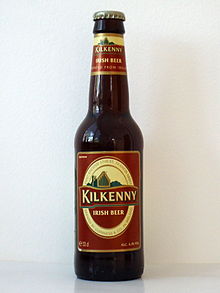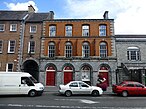
Stout is a type of dark beer that is generally warm fermented, such as dry stout, oatmeal stout, milk stout and imperial stout. Stout is a type of ale.

Pale ale is a golden to amber coloured beer style brewed with pale malt. The term first appeared in England around 1703 for beers made from malts dried with high-carbon coke, which resulted in a lighter colour than other beers popular at that time. Different brewing practices and hop quantities have resulted in a range of tastes and strengths within the pale ale family. Pale ale is a kind of Ale.

Irish red ale, also known as red ale or Irish ale, is a style of pale ale that is brewed using a moderate amount of kilned malts and roasted barley, giving the beer its red colour. Its strength typically ranges from 3.8% to 4.8% alcohol by volume, although some craft varieties can be as high as 6%.

Diageo plc is a British multinational alcoholic beverage company, with its headquarters in London, England. It operates from 132 sites around the world. It is a major distributor of Scotch whisky and other spirits. Distilleries owned by Diageo produce 40 percent of all Scotch whisky with over 24 brands, such as Johnnie Walker, J&B and Old Parr.

India pale ale (IPA) is a hoppy beer style within the broader category of pale ale.
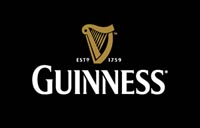
St. James's Gate Brewery is a brewery founded in 1759 in Dublin, Ireland, by Arthur Guinness. The company is now a part of Diageo, a company formed from the merger of Guinness and Grand Metropolitan in 1997. The main product of the brewery is Draught Guinness.

Harp Lager is an Irish lager created in 1960. It is produced by the Guinness Brewery, an Irish brewing company owned by Diageo, Formerly produced at the Great Northern Brewery in Dundalk, it is now brewed at the Guinness Brewery in Dublin. It is a major lager brand throughout most of Northern Ireland, but is now rarely available in the Republic of Ireland outside Dundalk, where most bars offer it on tap.
Beer in Africa, especially lager, is produced commercially in most African countries, and indigenous people also make varieties of beer. Beer is served in various locales, from neighbourhood shebeens to upscale bars. Many countries have standardized beer bottle sizes, which are cleaned and re-used, so when buying beer at a store, people often must pay a deposit on the bottle and the price of the beer. An alternative to glass-bottle beers is local beer sold in tetra-pak style paper cartons.

Brewing in Ireland has a long history. Production currently stands at over 8 million hectolitres, and approximately half the alcohol consumed is beer.
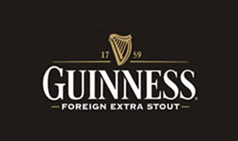
Guinness Foreign Extra Stout (FES) is a stout produced by the Guinness Brewery, an Irish brewing company owned by Diageo, a drinks multinational. First brewed by Guinness in 1801, FES was designed for export, and is more heavily hopped than Guinness Draught and Extra Stout, which gives it a more bitter taste, and typically has a higher alcohol content. The extra hops were intended as a natural preservative for the long journeys the beer would take by ship.

Kilkenny is a nitrogenated Irish cream ale from Guinness, which originated in Kilkenny, Ireland. The brand is produced and managed by Guinness owner, Diageo. It is available in draught, bottles and cans. It is brewed in Ireland. Kilkenny is similar to Smithwick's Draught; however, it has less hop finish, and it has a nitrogenated cream head similar to Guinness. The 'Kilkenny' name was originally used during the 1980s and 1990s to market a stronger version of Smithwick's for the European and Canadian markets due to difficulty in pronunciation of the word 'Smithwick's'. It now refers to a similar yet distinct beer.
The Great Northern Brewery, on the Carrick Road, Dundalk, County Louth, was an Irish brewery. It was home to Harp Lager, and was formerly owned by Diageo. In 2015 the brewery closed, and production of Harp Lager and other products was moved to St. James's Gate Brewery in Dublin. The site has since been bought by John Teeling, and converted for operation as a distillery, the Great Northern Distillery.
Caffrey's Irish Ale is an ale launched in 1994 by Bass Brewery and currently owned by Molson Coors.

Guinness is a stout that originated in the brewery of Arthur Guinness at St. James's Gate, Dublin, Ireland, in the 18th century. It is now owned by the British-based multinational alcoholic beverage maker Diageo. It is one of the most successful alcohol brands worldwide, brewed in almost 50 countries, and available in over 120. Sales in 2011 amounted to 850,000,000 litres. In spite of declining consumption since 2001, it is the best-selling alcoholic drink in Ireland where Guinness & Co. Brewery makes almost €2 billion worth of beer annually.
Lion Brewery or Lion Brewery (Ceylon) PLC is a predominantly Sri Lankan owned and operated brewery. The company is listed on the Colombo Stock Exchange and its stock is part of the S&P Sri Lanka 20 Index. Lion Brewery produces the highest selling beer, Lion Lager, in both Sri Lanka and the Maldives.

Smithwick's Experience Kilkenny is a brewery-turned-brewery-tour located on the "medieval mile" in Kilkenny, Ireland.

Porter is a style of beer that was developed in London, England, in the early 18th century. It is well-hopped and dark in appearance owing to the use of brown malt. The name is believed to have originated from its popularity with porters. Porter is a type of ale.
Beer in Northern Ireland has been influenced by immigration into Ulster, especially from Scotland, and the drinking habits in Ireland until the partition of Ireland. Whiskey drinking was always a tradition with Guinness from Dublin being a strong influence in the style of beer drunk in the 19th and 20th centuries. Brewing traditions almost ceased to exist as smaller breweries closed, or were taken over, and then the large breweries in turn closed down their facilities. The Campaign for Real Ale (CAMRA) was founded in 1971; however, it was 10 years before the first new brewery, Hilden Brewing, opened its doors.
Peter Smithwick was an Irish judge who served as chairman and the sole member of the Smithwick Tribunal, a Tribunal of Inquiry into the events surrounding the killing of Chief Superintendent Harry Breen and Superintendent Robert Buchanan of the Royal Ulster Constabulary (RUC).
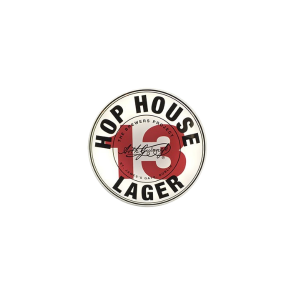
Hop House 13 is an Irish lager produced by the Guinness Brewery, an Irish brewing company owned by Diageo.

